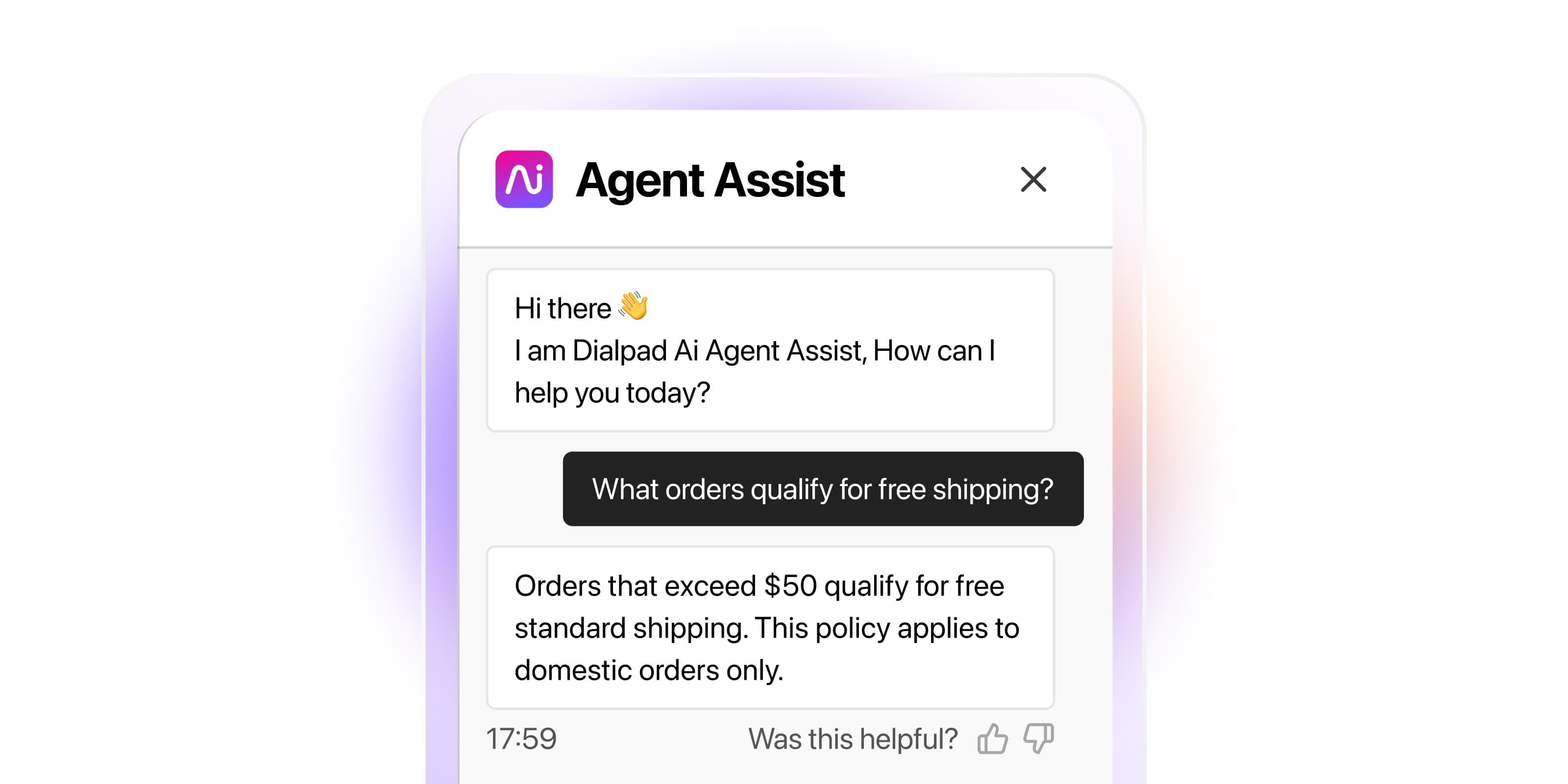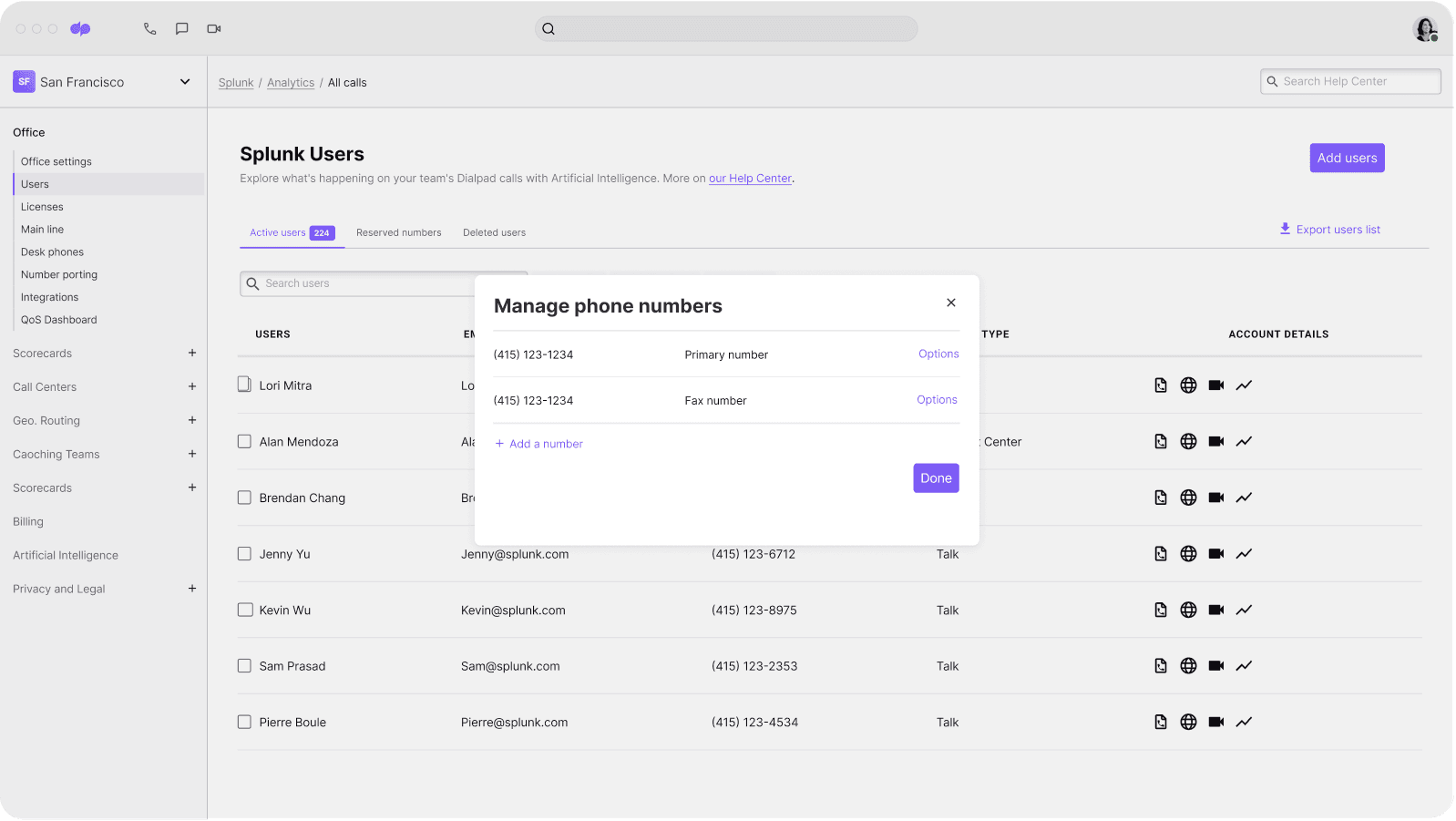Understanding enterprise AI: What it is and why your organisation needs to adopt it

Product Manager

Tags
Share
You’ll probably have read plenty about AI online recently. There’s more and more use for it in businesses across a wide range of industries, which is raising questions about when and how it should be used.
As a business leader, what do you need to be looking out for when it comes to enterprise artificial intelligence? How does AI for enterprise differ from standard AI software? Are there really as many risks to using AI as the papers would have you believe?
If you’ve found yourself asking questions like these, don’t worry. This article will provide the answers. We’ll delve into what enterprise AI is, how it can benefit your business, and what makes Dialpad for enterprises the right solution for you.
What is enterprise AI?
An enterprise is a large organisation or business—typically one that employs thousands of employees. AI is artificial intelligence—a group of technologies that enable computers to think like humans.
Put the two together, and you get enterprise AI. This is any artificial intelligence solution used by a large organisation to automate their processes, obtain insights from their data, or in any number of other use cases.
What’s different about implementing AI for an enterprise?
Many organisations, both large and small, have taken to using AI in the day-to-day running of their business.
They use it in everything from their decision-making processes to their enterprise VoIP solutions. But the way that AI is used by large, global organisations is often much different to the way it’s used by small and medium-sized businesses.
Firstly, enterprise AI is often implemented across the entire organisation. That means it impacts multiple departments, processes, and functions. In smaller businesses, AI is usually adopted to help with one or two specific tasks or functions and is implemented without altering the entire structure of the organisation.
Differences in the size of organisations also affect the scale at which AI is deployed. Smaller businesses will often adopt AI at one location at a time, potentially even on a user-by-user basis. Enterprise AI solutions, on the other hand, will often be deployed for thousands of users at a time at multiple locations around the world.

Non-enterprise AI applications will typically handle smaller datasets. In some cases, external large language models (LLMs) may even have to be used if the business doesn’t have access to enough of its own data to train the AI adequately. This means that the software uses data from LLMs like OpenAI as opposed to one that is custom-built. Enterprise AI will typically handle incredibly large volumes of data, often derived from multiple sources (or in Dialpad’s case, Dialpad Ai is based on over 6 billion minutes of business conversations.)
There are also differences when it comes to the ways that enterprise and non-enterprise AI solutions integrate with a business' other tools and technologies.
Enterprise AI should ideally integrate with all existing platforms and processes in place in an organisation. This can be a complex undertaking, requiring close attention to data governance policies while avoiding disruption to ongoing processes.
Non-enterprise AI technologies can often be standalone solutions that aren’t fully integrated into a larger ecosystem. In fact, successful integrations may require custom APIs or extensive modifications.
Finally, enterprise AI solutions are often highly flexible and customisable, allowing them to be deployed in a variety of use cases.
For example, an enterprise AI writing tool may be able to “learn from” a company’s own style guides and previous content, allowing it to generate customised content that perfectly aligns with the organisation's brand identity.
Why might your enterprise need AI?
Enterprise AI can provide a wealth of benefits to larger organisations. You can use AI in the enterprise:
To improve data analytics and uncover actionable insights
Large companies often have access to vast amounts of data. When used properly, it can be a valuable asset, but it can be a burden when used incorrectly.
Enterprise AI helps organisations use this data to make well-informed, data-driven decisions. It makes it possible for large volumes of data to be processed, analysed, and visualised, giving business leaders the best possible chance of deriving value from it.
That way, valuable insights can be extracted from huge datasets in a matter of minutes. Without the use of machine learning algorithms and other AI tools, this could take days or even weeks.
This saves businesses valuable time, effort, and resources that can then be directed towards tasks that add more value to the business.
To enhance forecasting accuracy and take proactive decisions
The ability to accurately forecast is incredibly important for large organisations. Understanding changes in the market and predicted progress towards targets allows business leaders to make proactive decisions to ensure success.
Enterprise AI tools can ingest large amounts of data almost instantly, providing an organisation with accurate, up-to-date forecasts. Business leaders can then use this information to pivot if necessary, reacting much more quickly than if they were having to rely on traditional spreadsheet analysis and manual calculations.
To uncover and achieve cost savings across the organisation
The automation offered by AI can help all manner of organisations reduce their labour costs. Almost all of an organisation’s processes can be streamlined with the use of enterprise AI, including facilitating effective enterprise collaboration.
So, while there may be a large initial investment, the long-term cost savings are often well worth it.
The money saved along the road can then be reinvested and reallocated into other areas of the business, enabling further long-term growth and increased financial stability.
Challenges of enterprise AI adoption
Implementing enterprise AI can bring an organisation various benefits, but there are also potential challenges that need to be carefully navigated:
Privacy and data security
It’s an unfortunate fact that any technology today is susceptible to security threats. Enterprise AI is no exception. Vulnerable AI systems can become a target for malicious attacks, potentially resulting in system failures, data breaches, and financial losses.
Protecting customer data while using enterprise AI requires robust security measures and strict adherence to data protection protocols.
It’s also worth remembering that there are many questions still to be answered regarding how some of the most popular AI platforms have trained their models. For example, ChatGPT developer OpenAI has been on the receiving end of multiple lawsuits alleging that copyrighted material was used to train their AI platform.
This should be a topic of concern for any enterprises thinking of using ChatGPT or similar platforms to power their AI initiatives.
An enterprise AI platform that’s built on private LLMs provides a better alternative. DialpadGPT, for example, is built specifically for use by businesses rather than the general public and, as such, provides a more secure experience.

Compliance and regulatory requirements
The use of AI is being carefully scrutinised for the legal and ethical dilemmas it raises. That’s particularly true in industries such as finance or healthcare, which are subjected to heavy regulation.
Organisations adopting AI need to be aware of the multiple stringent data privacy regulations that may apply. Mishandling personal information and failing to treat customer data with care can result in reputational damage and severe financial penalties.
Any enterprise AI tools used must ensure transparency and accountability. Ethically trained models should be employed wherever possible to minimise bias while simultaneously mitigating potential legal risks and maintaining the trust of the public.
Integration with existing processes and workflows
The more technologically complex a business landscape is, the greater the risk that AI systems will interact unpredictably with other systems and processes. This can lead to service disruptions, errors, and other unexpected consequences that can impact end users.
Organisations need to ensure that AI enterprise systems are integrated smoothly into their tech stacks and that data is synced across accurately. This is no small feat and can present a mammoth task in both time and resources for IT teams.
Impact on the current workforce
Implementing enterprise AI in an organisation can have a huge impact on the current workforce. It can represent a seismic cultural shift, changing processes and strategies that have long been in place.
Some employees may even react with fear due to the ongoing threat of jobs being replaced by AI or be sceptical about what AI tools can do and how they’ll be used.
Overcoming these stigmas often requires a robust change in management strategy, with a particular focus on communication and the dissemination of resources and information.
It’s also worth remembering that specialised skills are often required to build and use enterprise AI platforms effectively. This requires businesses to invest more in hiring talent or developing the skills of existing employees to meet these demands.
Harness the power of Dialpad Ai across your enterprise
Enterprise AI can be an incredibly powerful tool for large organisations. It can act as a transformative force, enabling businesses to improve their efficiency and make data-driven decisions across the board.
Of course, how successfully it’s implemented within your organisation is largely dependent on which platform you choose. It’s important to consider a wide range of factors, including security, scalability, and cost, when making a decision.
Dialpad provides an AI-powered cloud communication solution that unifies your employee and customer experiences in one platform.
Your employees will be able to seamlessly switch between conversations with customers, external partners, and each other while Dialpad Ai takes care of taking notes, protecting your CSAT scores, and more.
If security is one of your key concerns regarding AI enterprise software, Dialpad has you covered. Offering enterprise-grade security, Dialpad Ai is compliant with SOC II, GDPR, and HIPAA (for if you have customers on the other side of the pond).
So, what about the AI itself? Dialpad Ai is proprietary, and helps provide real-time support for enterprise sales, customer service, and team collaboration. As mentioned earlier, it’s trained on billions of minutes of customer interactions to provide more accurate insights.
For example, if you’re running a customer contact centre, Ai Recaps is a part of Dialpad’s enterprise contact centre software that can provide instant summaries of every interaction, complete with AI-recommended action items for agents to follow up on.
If you’re looking for a way to improve performance in your outbound sales centre, Ai Playbooks helps your sales conversations stay on target and maximise their chances of success.
What’s more, Dialpad provides 24/7 worldwide support for enterprises, so we’re always on hand to provide assistance should you run into any technical hitches.
So, why not get in touch and see how Dialpad can help you scale your teams and uncover valuable insights in real time?
Enterprise AI built for your needs
Book a demo, or watch a tour of the Dialpad app! See for yourself why enterprises like RE/MAX and Randstad use Dialpad.








